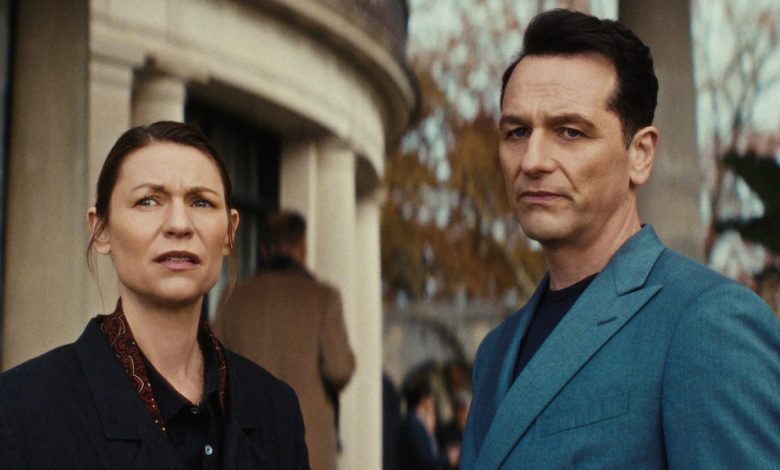Claire Danes and Matthew Rhys on the Liberation in ‘The Beast in Me’ Finale and Possible Second Season

[This story contains major spoilers from the finale of The Beast in Me.]
Like a moth to a flame, why are we drawn to the things that could destroy us?
That is one of many difficult questions at the heart of Netflix’s latest limited series, The Beast in Me, starring Emmy winners Claire Danes and Matthew Rhys. Created by Gabe Rotter and executive produced by 24 and Homeland showrunner Howard Gordon, the eight-part psychological thriller stars Danes as Aggie Wiggs, a Pulitzer Prize-winning author paralyzed with grief over the tragic death of her young son, Cooper (Leonard Gerome), four years earlier. Aggie’s life of suburban seclusion is upended by the arrival of Nile Jarvis (Rhys), a formidable real estate mogul who, after being the prime suspect in his first wife Madison’s (Leila George) unsolved disappearance, moves in next door with his new wife, Nina (Brittany Snow).
Feeling creatively uninspired by her long-gestating follow-up book about the unlikely close friendship between Supreme Court justices Ruth Bader Ginsburg and Antonin Scalia, Aggie takes a perverse interest in Nile, who has long maintained his innocence. “He animates a part of her that she has been in staunch denial of — this visceral, predatorial, furious self that is kicking and has become a bit rabid inside of her,” Danes, also an executive producer, tells The Hollywood Reporter in a joint interview with Rhys.
As much as they might be loath to admit it, Aggie and Nile surprisingly share a lot in common, one of those things being the guilt they feel over the loss of someone very close to them — but they go about processing that grief very differently.
“They’ve been isolated for some time because of their respective traumas and tragedies. And as a result, it brings them to a level where, it’s not that they don’t care, but their bullshit meter is gone so that any kind of falseness isn’t put up with,” explains Rhys. “Their intellect, perception of others, and their at times very dry and dark humor bonds them to a degree. So there are a number of elements drawing them and pushing them away from each other, but it’s that age-old cliché of the magnets that keep making their way back to each other.”
As Danes points out, Aggie is the only person in the neighborhood who says no to Nile’s initial proposal to pave a communal jogging path in their shared woods, and “he is the only person who refuses to respect her wish to be left the fuck alone” in her house. “So they’re both pretty tenacious and uncompromising, and brilliant. I don’t think that they’ve found people who can keep up with them very easily,” she says.

At once irked and fascinated by her new neighbor, Aggie convinces Nile to be the subject of her next book under the guise of finally giving him a chance to tell his side of the story after years of being vilified in the court of public opinion. But, really, she wants to find out the truth about what happened to Madison. Against his better judgment, Nile agrees to let Aggie write his biography — an “extraordinary gesture” that, Danes says, “really terrifies her” — if only because he believes he can manipulate her into believing his carefully constructed version of the truth.
By the time she crosses paths with Nile, Aggie has still failed to acknowledge her role in Cooper’s death. Rather than facing the fact that she was distracted behind the wheel when she and her son got into a head-on collision, Aggie has convinced herself that Teddy Fenig (Bubba Weiler), a local teen, had been driving under the influence, even though she doesn’t have any evidence to back up her claims.
In her own twisted way, Aggie “needs to know if [Nile killed his wife] because she needs to know if she killed her son. That question is raging for her, and she’s fixated all of her complex feelings, all of her grief, onto this man who she holds strictly responsible,” Danes explains of Aggie’s fear of looking in the mirror, both literally and figuratively, until Nile forces her to confront her repressed memories. “But there’s a much deeper fear that suddenly she has to address in her own life. That’s what really is motivating her. That’s why she’s in desperate pursuit of [the truth], and why she’s willing to risk everything. [But] what is she risking, really?”
Over the course of the show’s first six episodes, Aggie plays a dangerous game of cat-and-mouse with Nile. Wanting to make peace after getting off on the wrong foot over the jogging path, Nile invites Aggie to lunch, where Aggie confides in the suspected killer about wanting Teddy “to suffer” for Cooper’s death in the same way she did. At the end of the pilot, Brian Abbott (David Lyons), an FBI agent who had unsuccessfully pursued Nile for financial crimes, drunkenly knocks on Aggie’s door in the middle of a late-night storm and warns her to stay away from Nile. Aggie learns the next morning from her ex-wife, Shelley (Natalie Morales), that Teddy has disappeared seemingly without a trace.
Unable to shake the sinking feeling in her stomach, Aggie confides in Abbott that she believes Nile was responsible for Teddy’s disappearance. Together, the pair hatch a plan for Abbott to steal Nile’s biodata from his personal laptop — while Nile, Nina and Aggie attend the birthday party of his much younger twin half-brothers — in order to ascertain his whereabouts on the night Teddy went missing.
After just barely managing to get away before Nile and Nina returned home, Abbott does not find records of Nile’s location, but he does find a live video stream of Teddy being held captive. In a well-intentioned but misguided attempt to protect Aggie, who would be the most obvious suspect in Teddy’s disappearance, Abbott lies about coming to a dead end. Instead, he decides to confront Nile himself about kidnapping Teddy, but Nile ends up bludgeoning Abbott to death in the ensuing face-off.
Despite continuing to flip-flop between whether she believes her neighbor is innocent or guilty, Aggie finds herself unexpectedly charmed by Nile, who shows up at her door, shortly after secretly killing Abbott, looking for a drink. The boundaries of Aggie and Nile’s relationship get even blurrier after the two spend a night drinking and even dancing to Talking Heads’ “Psycho Killer” in Aggie’s house.
But just as she begins to let her walls down around Nile, Aggie makes a shocking discovery in her investigation. During her meeting with Madison’s brother, Chris (Will Brill), Aggie learns that Madison’s parents — who have maintained their belief that Nile is innocent and that Madison died by suicide — have invested their life savings in Nile’s latest real-estate venture, Jarvis Yards, which is now at risk of going under. Chris, who has harbored doubts about what really happened to Madison, gives Aggie a box of his sister’s belongings. Inside that box is a private bird-watching journal that proves Madison’s suicide note was actually written after a previous attempt to take her own life, not the one that led to her eventual disappearance.
Aggie attempts to relay that bit of crucial evidence to Abbott, unaware that Nile has already killed him. Once he realizes that Aggie is on to him, Nile decides to toy with Aggie even further. When she returns home, he asks her to take a walk with him in the woods before she makes up an excuse to go inside. Aggie quickly discovers that Nile has broken into her home and read the first draft of her book about him — and he leaves a parting gift in the form of Teddy’s dead body in her own dead son’s bedroom.
“Shooting that sequence where he calls her, and she starts to intuit what she’s going to find in the bedroom — that was not so pleasant. I was literally sick to my stomach just imagining it. But I thought that was an amazing piece of writing,” Danes says of the “perfectly grotesque” ending to episode six. “I loved that that was the act of betrayal and ultimate evil. I loved that it takes place, literally, on the same spot where she shared her most vulnerable self with him hours before, and that exchange [where she bares herself to Nile] is truly healing for her. She transforms into a more honest, more fully realized, better version of herself. And in that same emotional space and literal space, this horrendous event happens.”
The seventh episode, titled “Ghosts,” jumps back in time to reveal what led to Madison’s death during Christmas 2019. At the time, Nile was being investigated by the feds for funneling money from cartels to fund the construction of Jarvis Yards. After concluding there was a mole in his inner circle, Nile immediately suspected that Nina, Madison’s then-executive assistant, was to blame. But Nina is actually the one who reveals that Madison was the one who turned on the Jarvis family. In a direct callback to the way he killed Abbott at the end of the fourth episode, Nile then committed a crime of passion, bludgeoning Madison to death, battering her face into a bloody pulp.
“I did not an inordinate amount of reading, but [a little bit of reading] about impulse killings, which I found equal parts disturbing but interesting, and how more often than not, in an impulse killing, the person doing the killing sees themselves as a victim,” Rhys explains. “I leaned into that a little for Nile. These impulses come from a wrongdoing that he sees as having been done upon himself from an earlier age, and it was primarily that, really. He’s doing this because of something that’s been done to him.”

For Rhys, Nile’s “originating wound” was inflicted in his childhood by his ruthless father Martin (Jonathan Banks), a real-estate tycoon who, despite not being a very active parent, has always felt the need to clean up Nile’s messes. “The constant barb in his side is what his father did to him, and the expectation [thrust] upon him after what happened to his brother [who died], and how that magnified what was expected of Nile and his guilt for surviving,” Rhys says. The show is, ultimately, “an ancient fable of father and son, and how incredibly destructive it can be [for the son] in the search of approbation.”
When filming began, Danes and Rhys only had access to the first three scripts and had to trust that Gordon and his writers would successfully resolve the storyline. “I had seen him perform one magic trick after another for a decade over the course of our filming Homeland, so I wasn’t worried. I really wasn’t. But I also had no idea what was going to happen,” Danes says. It wasn’t until late in production that Gordon clued his actors into the deadly conclusion.
In a last-ditch plea for help before turning herself over to the authorities, Aggie ambushes Nina at her art gallery and tries to convince her of her husband’s guilt. Aggie goes one step further and says that she can empathize with Nina’s deep denial over her role in Madison’s death because she spent years doing the same thing to evade blame for her son’s passing.
Later that evening, Nina, who is also pregnant with Nile’s child, finally confronts her husband with the litany of evidence that Aggie has compiled. In a fit of rage, Nile not only admits to the murder, but he also mocks Nina for being wilfully blind to Madison’s death. But what Nile fails to realize is that Nina has recorded their conversation, leading to his very public arrest the following day. Rhys believes that Nile, in the end, “totally” underestimated what Nina was capable of.
“We’ve lived with Nile’s confidence for all those episodes, and then it’s like this enormous rug pull, which is always glorious to watch,” Rhys says of Nile’s reaction to being led away from a Jarvis Yards press conference in handcuffs. “I think as an audience, we always have this thing where we watch things desperately in need that there is some cosmic karma. So you’re kind of going, ‘Something has to happen.’ Yes, he gets killed at the end, but you want to know what is the real shank — the emotional shank, not the prison one — that gets to him. And that is it. And when that came, I was like, ‘Wow, that’s the one that decimates him.’”
Despite him framing her for murder, Aggie decides to meet Nile in prison for one last interview for her book. That ends up being their final conversation, as Nile’s uncle Rick (Tim Guinee), who has always been more loyal to Martin, pays off a prisoner to stab Nile to death in prison. True to form, even in his final moments, Nile sees himself as a victim, Rhys says. “Nile is thinking, once again, that he’s been wronged in the most final way; that there’s this great degree of injustice that’s been served to him.”
Rhys has died on-camera a handful of times — most notably in Titus opposite Anthony Hopkins, and Cocaine Bear — but he particularly relished the opportunity to splutter up blood for a particularly gruesome ending. “Weird things go through your head when you’re doing those kinds of scenes where you’re just like, “I’ve seen this done so badly so many times. I wonder if I’m doing it as bad as [them],’” he says with a wry smile. “You have those things where your third eye is on yourself going, “Gosh, that death in Terminator 2 — I hope I can do it as well as that when he runs out of breath.’ That’s my process. That’s my weird brain.”
Danes is reluctant to offer her thoughts about what Aggie’s life might look like going forward, in part because she wants to leave that choice in the hands of Gordon, who has expressed interest in potentially making a second season. But after the credits roll, “I’d like to think that she’s a little more integrated as a person. I don’t know if she will start another relationship. I don’t know if she is able to do that. But I don’t think she’s suffering from writer’s block anymore,” she says with a laugh. “I think she’s more liberated.”
Viewers get a brief glimpse of Aggie’s new life in a coda, where she reads a passage from her latest bestseller — fittingly titled The Beast in Me — in front of a live audience.
“Is it karmic justice? A happy ending? Retribution is seductive like that, promising a clean line between good and evil. But it’s an illusion. I know because I felt its pull,” she reads aloud. “After losing my son, I cradled vengeance like a second grief, a sacred companion. I told myself a story about right and wrong, about punishing the guilty. Nile smelled my bloodlust and midwifed that story into being. He soaked up my rage and, like some dark angel, made manifest a wish too horrible to name, leaving another mother to grieve her son. Another rage to grow unchecked. Vengeance birthing vengeance. A wound that never heals. I am complicit in this cycle. My hands are far from clean.”
In the end, The Beast in Me — with its deft navigation of the gray areas between justice and vengeance, truth and self-delusion — refuses to offer any easy answers to these uneasy questions of moral responsibility. The series, by design, challenges viewers to look past the satisfying simplicity of revenge and instead confront the difficult, often ambiguous, consequences of seeking retribution.
“As much as everyone, I think to a degree, hopes for this universal karma, it comes at a great cost, and it’s not as true and pure and linear as you hope it is,” Rhys says of his major takeaways from the series. “It’s not straightforward, and there is a great cost to what one deems as the cosmically right outcome. So I always enjoy how gray those issues are or how muddied they are.”
“It’s very easy to ascribe blame and vilify another,” adds Danes. “I think it’s much more challenging to recognize our own complicit-ness in whatever dysfunction we may be experiencing in our lives or in the world at large, and taking a certain kind of stock and personal stock and personal responsibility. That would be nice if we did more of that.”
***
The Beast in Me is now streaming on Netflix. Read star Brittany Snow’s interview about the Beast in Me ending here.
HiCelebNews online magazine publishes interesting content every day in the TV section of the entertainment category. Follow us to read the latest news.





